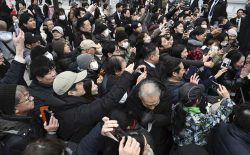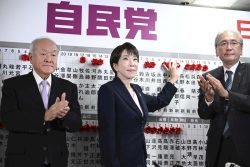Japan Plans to Support ‘Urban Mining’ in ASEAN Countries; Metals From Used Electronic Devices Help Build Japanese Circular Economy

The Prime Minister’s Office in Tokyo
14:11 JST, December 28, 2024
Japan will step up imports of used electronic devices from countries in the Association of Southeast Asian Nations in order to promote the development of so-called urban mining, a method of recovering rare metals, overseas.
By providing guidance on how to collect and dismantle e-waste to people in Indonesia and four other ASEAN members, as well as support in establishing legal systems for this process, Japan intends to promote trade between these countries and Japanese companies.
“Urban mining” is a term referring to recovering useful materials such as copper and rare metals from the circuit boards of used electronic devices, like computers and smartphones. These materials can then be reused.
Japan, a resource-poor country, relies on imports for many kinds of rare metals, and it has been using its advanced technologies for removing impurities and recovering necessary metals to promote the collection and recycling of e-waste.
The volume of material recycled in Japan from used electronic devices reached 361,000 tons in 2019, more than any other Organization for Economic Cooperation and Development (OECD) member country, but it has remained flat since then. Japan hopes to increase the total volume by strengthening its system for importing materials from ASEAN members.
In ASEAN countries, no legal system related to the collection and processing of e-waste has been established, and technology for dismantling these materials is currently insufficient. As this will also help to prevent environmental pollution in these areas, Japan plans to provide both legal and technological support, aiming to “fence off” these urban mining resources.
The government has already begun providing technical support to ASEAN countries since the previous fiscal year, and will begin providing legal support to five countries — Indonesia, Thailand, the Philippines, Malaysia and Vietnam — as early as this fiscal year. It also plans to begin importing devices from these countries by fiscal 2028.
Currently, about 60% of the e-waste imported by Japan comes from Europe and North America. With European Union countries now making a big push to strengthen recycling, there are also economic security reasons for Japan to look to ASEAN as an alternative import source. Japan is also laying out a blueprint for eventually achieving widespread resource circulation by exporting products made from recycled metals.
The Japanese government is aiming to transition to a circular economy, in which resources and products are efficiently used and waste generation is reduced.
Top Articles in Politics
-

LDP Wins Historic Landslide Victory
-

Japan Tourism Agency Calls for Strengthening Measures Against Overtourism
-

LDP Wins Landslide Victory, Secures Single-party Majority; Ruling Coalition with JIP Poised to Secure Over 300 seats (UPDATE 1)
-

Japan’s Prime Minister: 2-Year Tax Cut on Food Possible Without Issuing Bonds
-

Voters Using AI to Choose Candidates in Japan’s Upcoming General Election; ChatGPT, Other AI Services Found Providing Incorrect Information
JN ACCESS RANKING
-

Japan Institute to Use Domestic Commercial Optical Lattice Clock to Set Japan Standard Time
-

China Eyes Rare Earth Foothold in Malaysia to Maintain Dominance, Counter Japan, U.S.
-

Man Infected with Measles May Have Come in Contact with Many People in Tokyo, Went to Store, Restaurant Around When Symptoms Emerged
-

Japan, Qatar Ministers Agree on Need for Stable Energy Supplies; Motegi, Qatari Prime Minister Al-Thani Affirm Commitment to Cooperation
-

Australian Woman Dies After Mishap on Ski Lift in Nagano Prefecture






















